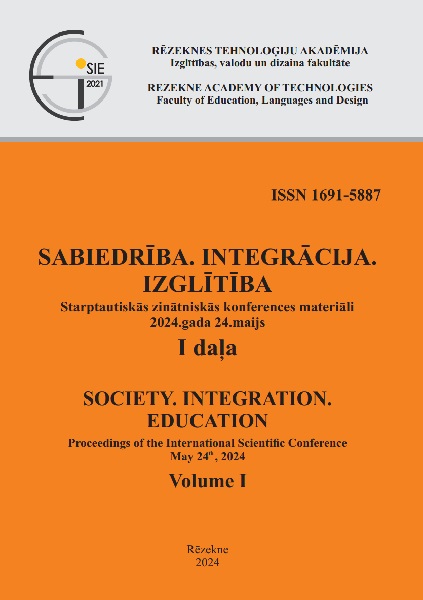PARTICIPATION OF ROMA PUPILS IN NON-FORMAL EDUCATION IN LITHUANIA
DOI:
https://doi.org/10.17770/sie2024vol1.7882Keywords:
: parents of pupils, participation in non-formal education, Roma pupils, social pedagogues, workers of non-governmental organizationsAbstract
While Lithuania has made significant progress in integrating Roma pupils into the education system, real changes are still insufficient and require attention to the participation of Roma pupils in non-formal education. The aim of this paper is to highlight the opportunities and limitations of Roma pupils' participation in non-formal education. Semi-structured interviews were used to collect qualitative data. The participants in the study included 11 parents of Roma pupils, 8 school social pedagogues, and 3 workers from NGOs. Content analysis was conducted. Roma parents relate the benefits of non-formal education to children's meaningful leisure time, the development of skills necessary for a successful future, and the improvement of health. Parents face problems related to the accessibility and financing of non-formal education for pupils with special needs. Social pedagogues observe the involvement of primary school Roma pupils in events, various sports, or art groups. However, teenagers tend not to participate in non-formal education at school. Teenagers engage in non-formal education outside of school when events or sports activities are financed by sponsors rather than the family budget. Recognition of the contribution of NGOs in supporting and involving Roma pupils in non-formal education is crucial. This support is not only important for the promotion of Roma identity but also for strengthening the motivation of teenagers to attend school classes.
References
Bejko, L. (2023). The potential of non-formal education in Europe: Opening doors and fostering development. Circle of Sustainable Europe. Retrieved from https://cose-eu.org/2023/06/19/the-potential-of-non-formal-education-in-europe-opening-doors-and-fostering-development/
Buces, M. (2023). Breaking barriers to Roma children's education and inclusion. Eurocities. Retrieved from: https://eurocities.eu/latest/breaking-barriers-to-roma-childrens-education-and-inclusion/
Carrera, S., Rostas, I., &Vosyliūtė, L. (2017). Combating Institutional Anti-Gypsyism: Responses and promising practices in the EU and selected Member States. CEPS Retrieved from: https://aei.pitt.edu/87207/1/RR2017%2D08_AntiGypsyism.pdf
Council of Europe. (1995). Framework Convention for the Protection of National Minorities (ETS No. 157). Retrieved from: https://www.coe.int/en/web/conventions/cets-number-/-abridged-title-known?module=treaty-detail&treatynum=157
Council of Europe. (2013). Recommendation on effective Roma integration measures in the Member States. Retrieved from: https://eur-lex.europa.eu/legal-content/EN/TXT/?uri=CELEX:32013H1224(01)
Department of National Minorities. (2022). Approval of the Roma Integration Action Plan 2022-2023. 2022/UE-33. Retrieved from: https://shorturl.at/uDIR6
Gaižauskaitė, I., & Valavičienė, N. (2016). Social Research Methods: Qualitative Interviewing. Vilnius: Mykolas Romeris university.
Jevsejevienė, J., Survutaitė, D., Šetkus, B., &Zablackė, R. (2022). Analysis of the state of education of national minorities in Lithuania. National agency of education. Retrieved from: https://www.nsa.smm.lt/wp-content/uploads/2022/05/Tautiniu-mazumu-svietimo-bukles-analize-2022-05-23.pdf
Kontvainė, V. (2016). Feasibility Study on the Cooperation between Roma Communities and Municipalities in the Implementation of the Action Plan for the Integration of Roma into Lithuanian Society 2015-2020. Vilnius: Department of National Minorities under the Government of the Republic of Lithuania. Retrieved from: https://www.romuplatforma.lt/wp-content/uploads/2017/02/Savivaldos-ir-romu-bendradarbiavim-o-galimybiu%CC%A8-studija-2016-08-10.pdf
Leonaitė, E., Valentinavičius, V., Osičnaitė, F. V., Jurevičiūtė, G., Balčiūnaitė, M., & Bylaitė, G. (2022). 2022 Human Rights Observation Report. Retrieved from: https://www.lrski.lt/wp-content/uploads/2023/04/ZTS-ataskaita_2023-04-14_su-navigacija2.pdf
Ministry of Culture of the Republic of Lithuania. (2015). On the Approval of the Action Plan for the Integration of Roma into Lithuanian Society 2015-2020. Retrieved from: https://e-seimas.lrs.lt/portal/legalAct/lt/TAD/6caa6010a8cb11e4a854e1c2026e476c/asr
Ministry of Education, Science and Sport. (2021). Education of National Minorities. Retrieved from: https://smsm.lrv.lt/lt/veiklos-sritys-1/smm-svietimas/svietimo-sistema-ikimokyklinis-ugdymas/tautiniumazumusvietimas
Petrušauskaitė, V. (2014). (I)nequal opportunities in education: an analysis of the early exit of Roma children from the education system in Vilnius city. Ethnicity Studies, 1, 7-163.
Račkauskaitė, G. (2017). Compatibility of local Roma integration measures with the Action Plan for the Integration of Roma into Lithuanian Society 2015-2020 and the Council of Europe Recommendations on Effective Roma Integration Measures in the Member States: Participation of Lithuanian Roma in the Education System. Lithuanian Roma Platforms. Retrieved from: http://www.romuplatforma.lt/wp-content/uploads/2017/02/4.6.-WS-3-output-5-research-study-on-local-Roma-integration-measures-with-special-focus-on-education.pdf
Roma Community Center. (2019). Civil society monitoring report on the implementation of the national Roma integration strategy in Lithuania. Retrieved from: https://cps.ceu.edu/sites/cps.ceu.edu/files/attachment/basicpage/3034/rcm-civil-society-monitoring-report-3-lithuania-2019-eprint-fin.pdf
Survutaitė, D. (2023). An Analysis of Lithuanian General Education School Teachers' Experience. Pedagogy, 151 (3), 150-171. DOI: https://doi.org/10.15823/p.2023.151.8
The Council of the European Union. (2021). Recommendations on equality, inclusion and participation of Roma. (2021/C 93/01). Retrieved from: https://eur-lex.europa.eu/legal-content/LT/TXT/?uri=CELEX:32021H0319(01)
Žemaitėlytė-Ivanavičė, I. (2018). Roma in primary school: between selective isolation and complete levelling. Acta Paedagogica Vilnensia, 41, 72-86. DOI: https://doi.org/10.15388/ActPaed.41.12375






